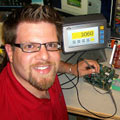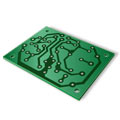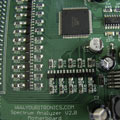Over the years, many people have reviewed our products. Here are just a few
Protostack ATmega32A Development Kit Review by Øyvind Nydal Dahl

“The Protostack development kit is a great choice for getting a microcontroller set up quickly. I love how easy it is to get it up and running. It’s also a good choice for beginners who wants to program a microcontroller without all the overhead of an Arduino.”
TweakTown Protostack ATmega32A Development Kit Review

“Protostack has a winner on its hands with the ATmega32A Development Kit. The microcontroller featured in this kit has ample program memory for even the most code-heavy DIY projects. With all of the extra prototyping space and stackability, only the sky is the limit to what you can put together with this board. The extra I/O that you gain from the 40-pin chip will definitely come in handy in some of my upcoming projects as well.”
Protostack ATmega32 Development Kit Review by John Boxall from tronixtruff

“It’s a solid kit, the PCB is solid as a rock, and it worked. However it could really have used some spacers or small rubber feet to keep the board off the bench. Otherwise the kit is excellent, and offers a great prototyping area to work with your projects. If you order some, Protostack have a maximum delivery charge of $9 so you won’t get burned on delivery to far-flung places. “
ATmega8A Development Kit Review by Daniel Andrade

“Overall I liked the board, easy to assemble and to use, it’s a great way to explore the world of microcontrollers outside the Arduino environment.”
ProtoStack ATmega328 Kit Review by Eric Holland

“Overall I am pretty happy with the ProtoStack ATmega328 Development Kit and would highly recommend anyone getting one. I am excited to build up a few new projects with this board; having the extra prototyping space without having to stack a proto shield is a huge plus.”
ProtoStack ATmega328 Kit Review by Darius Vainilavičius

“Soldering of the board was easy, because where wasn’t any SMD components, every component has marked place on the PCB with specified value, so it’s is easy to tell which capacitor or resistor goes where.”
ATmega328 Development Kit Review by Tomaž Šolc

“Obviously versatility in all respects was a priority. The board has space for either an on-board TO-220 regulator (with two possible pinouts covering the popular options like 7805 and 1117) or a CR2032 battery holder. The 34 page User’s Guide contains descriptions of several power supply configurations for either external or internal power.”
ATmega168a Development Kit Review by Oak Kar

“Well designed and good quality PCB, Doubled side PCB but for through hole components ( as a developer, I love to solder through hole although SMD parts are fun for me), Plenty of spaces for prototyping area…”
AVR Prototyping Board Review by Jon Oxer

“huge prototyping area, which means you can do lots of things with it. It is really really cool, I’m really impressed with these boards, I like them a lot”
ATmega8 kit Review by uC Hobby

“The prototyping area is well marked and matches the familiar solderless breadboard layout. Easy access to all the I/O ports and the support for the programmer round out this board and should make it easy to use.”
ATMEGA8 Development Kit Review by electronics-lab.com

“Protostack.com offers an affortable ATMEGA8 Development KIT for anyone looking to start building their own microcontroller projects.”
ATMEGA8 Development Kit Review by Peter Lavelle

“I wouldn’t hesitate to recommend Protostack, or this development kit, to anyone getting started in the world of electronics and Microcontrollers.”
ATmega8 kit Review by youritronics.com

“The prototyping area is similar to a breadboard, the major difference is that the ATmega8 ports are nicely ordered, the supply and ground pins are connected together, and the programming pins are tied to a 10 pin header.”


